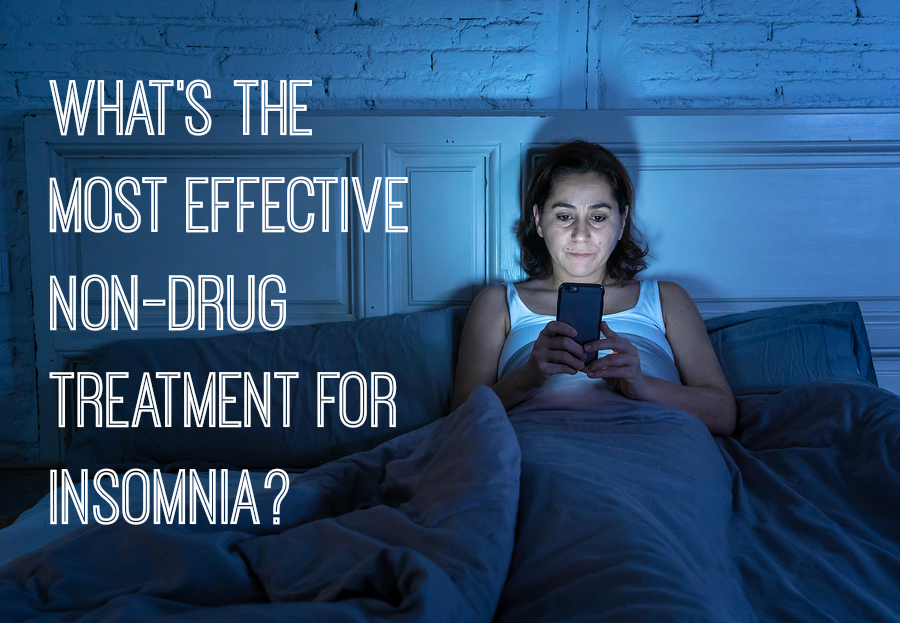
Insomnia is a common sleep disorder associated with problems falling asleep, remaining asleep, and/or early morning awakenings. The American Academy of Sleep Medicine explains that the disorder is often diagnosed when a person struggles to sleep despite having plenty of opportunity for it.

Lauri Leadley, Clinical Sleep Educator, President of Valley Sleep Center
For many years, sleeping pills were the main source of treatment for the disorder. In the early 2000s, cognitive behavioral therapy for insomnia (CBT-I) started to be more deeply explored as an alternative treatment. Today, it is the preferred treatment for chronic insomnia. But what is CBT-I?
What is Cognitive Behavioral Therapy for Insomnia (CBT-I)?
Valley Sleep Center’s Behavior Sleep Health Provider, Adam Frose, Ph.D. describes CBT-I as, “a provisional treatment or ‘talk therapy’ for insomnia that is founded on scientific knowledge about sleep. It is effective in improving the quality of sleep and in helping people sleep longer.”
CBT-I is a goal-directed therapy that helps you to fall asleep and stay asleep, as well as improve your quality of life and daytime functioning. It is more than just sleep advice. CBT-I provides you with skills that are useful if your insomnia should recur later in life. Dr. Frose explains, “The ‘cognitive’ part of CBT-I concentrates on your thoughts, feelings, and anticipations about sleep and insomnia that may affect how well you sleep. The ‘behavioral’ part of CBT-I helps you adopt healthy sleep habits – based on the science of sleep – that will help you sleep better.”
This therapy is administered by a medical professional who has expertise in sleep disorders. It may be conducted by a psychiatrist, psychologist, or another medical doctor who has received special training.
What Does CBT-I Treatment Include?
An important part of CBT-I is education. You will learn about normal sleep and what affects your sleep quality and quantity. You will learn about your circadian rhythm and how this biological function impacts your sleep.
Your specialist will access your individual issues, as no two cases of insomnia are the same. You will need to identify your specific insomnia-inducing triggers so that they can be properly defused. Dr. Frose says that “If you decided to take part in CBT-I, you will be asked to describe your sleep problems and monitor your sleep using a sleep diary to help your provider understand what your insomnia is like.” He also stresses that it is important to “attend sessions regularly and practice your new CBT-I skills in your life outside of your meetings.”
With deliberate guidance, CBT-I will teach you how to develop healthy and effective sleep habits. You will learn techniques to calm the mind and how to manage stress so that you can drift off to sleep peacefully and not wake with racing thoughts. The program is deeply individualized and will incorporate a sleep-wake cycle that will meet your personal needs.
How Long Does Cognitive Behavioral Therapy for Insomnia Last? How Do I Know If It’s Working?
According to Dr. Frose, “CBT-I requires an average of only six meetings to be effective. In some cases, more sessions may be recommended, but there is also a chance it will improve in less than six sessions. Each session lasts about 50-60 minutes.” These sessions are typically scheduled weekly or bi-weekly.
During your sessions, your progress will be monitored closely, and your specialist will provide you with the proper guidance to help you meet your goals. Dr. Frose claims that “Most people undergoing CBT-I experience improvement in the quality of their sleep first and then begin to sleep longer. They also experience improved alertness and energy. Continuing to use the skills you learn in CBT-I can help you sleep well long after the treatment ends.”
Who Benefits from CBT-I?
CBT-I can effectively help to end insomnia whether it is something new in your life or something you have been struggling with for years. The Chronic Insomnia Task Force of the American Academy of Sleep Medicine is so sure of its effectiveness that it is their recommended, first-line treatment for the disorder. It is also an effective treatment for people whose sleep suffers because of a medical condition – such as chronic pain or mood disorders.
How to Find a CBT-I Specialist
Valley Sleep Center is fortunate enough to have Dr. Adam Frose, a Behavior Sleep Health Provider, on our team. Dr. Frose is a member of the American Psychological Association, Arizona Psychological Association, Society of Behavioral Sleep Medicine, and Society of Health Psychology.
If you are unable to see Dr. Frose, the American Board of Sleep Medicine has a list of CBT-I providers here.
Sleep plays an important role in maintaining a healthy, happy life. If you suffer from insomnia, we urge you to schedule a consultation with Valley Sleep Center today. You can call us at 480-830-3900 or schedule an appointment online.

